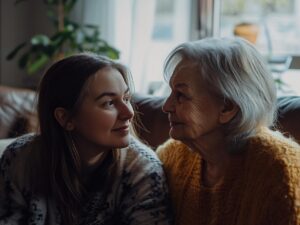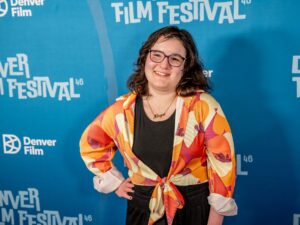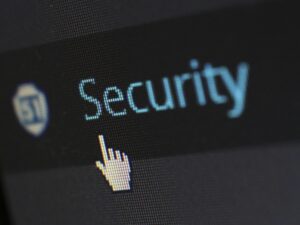Popular NBC comedy, Superstore, will be going into it’s sixth season, but did you know that Lauren Ash, who plays Dina on the hit series, had real-life experience in a Canadian Superstore? Zellers to be exact. The Belleville, Ontario native got her start in the footwear department at the tender age of 15. At 18, she left Zellers behind, moving to Toronto for theatre school, quitting just a few months later. She stayed in Toronto and ended up at The Second City doing shows and honing her improv skills. She remained in The Second City family, moving to Chicago for two years to star on their main stage.
Ash got into a bad car accident after moving to LA. After the accident, she made the decision to move to Toronto to put down some roots. As luck would have it, after signing the mortgage papers, she got a call back for Super Fun Night with Rebel Wilson and the rest is history. A scene stealer from the start, she is one of the most entertaining actors on TV today. As if she wasn’t busy enough, she also has her own podcast, Giving It Up for Less.
That’s not all Lauren Ash is about though. She is also an outspoken advocate for polycystic ovary syndrome (PCOS) and an outspoken ally for Black Lives Matter and for many other causes. She is genuine. When you see her Social Media accounts – that’s the first word that pops into your head. Speaking with her from her home in LA, reinforced that feeling. She’s funny, she’s authentic and she’s our latest #WomenInspiringWomen.
You have made it as a working actress/comedian in the USA. Why do you think you have been successful in what is known to be the world’s most difficult market?
I have to attribute a lot to my training that I got at The Second City. I toured out of Toronto for three years, I did the mainstage in Toronto for two years and then I did the mainstage in Chicago for two years. That adds up to seven years of sketch and improv performance training. I really attribute a lot of my success to having this strong background in performance, improv and comedy. It is something that is a strength of mine. In many ways, I’m unflappable in high pressure auditions. I’ve had other people in those situations call me out asking “How are you so calm right now?” I always said that I’m not calm, I’m just not showing my fear. When you are writing shows at Second City, you are trying things that may work or may not and you fail as much as you succeed. In my opinion, it gives you a pretty thick skin. It really helped pave the way for my success in America.
You come from an improv background through your time at The Second City. How much improv can you bring to the table in a scripted series?
It really depends on the show. On Super Fun Night, which was a great experience, we did improvise but they didn’t always use it. They stuck more to the scripts. On Superstore we get every scene as it’s scripted, but then, we always improvise. What’s been amazing is that they use a lot of it. It’s been a creatively fulfilling experience for me because I go to work and I feel like I’m collaborating on something. Getting to work with fellow Canadian Mark McKinney, who is one of my comedy idols, and getting to improvise with him every day is not only a dream come true, but it’s really exciting.
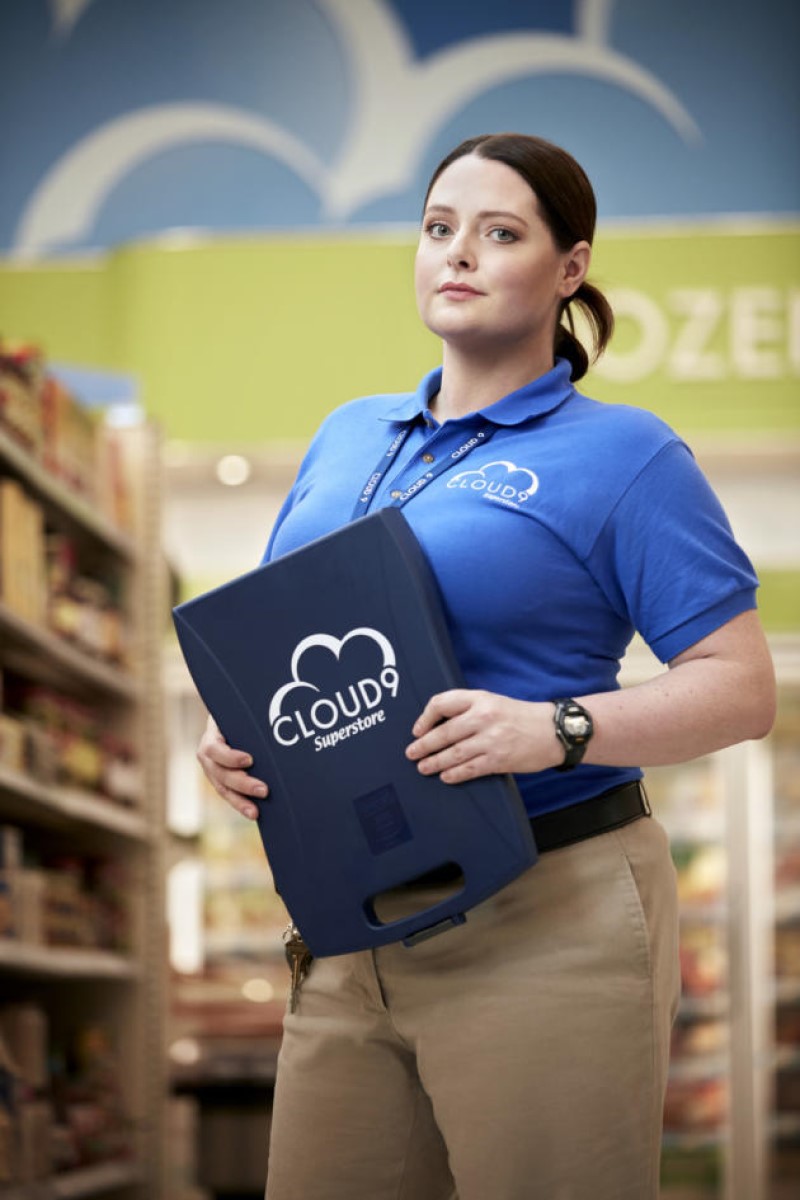
Superstore has been an amazing experience and I can’t speak more positively about it. I’m very proud of the show and the topics that we cover. I’m proud that we are representing the world, more specifically America and reflecting the stories of average people here. I improvise every day and it’s my dream job. I also have to credit the creators, the show runners and the network that allow us to have that space. Not all shows work that way. I’m sure that there are pros and cons to both, but for me personally, the way we work and the way the show works in allowing us to have that space to improvise is a real gift.
You wrote an episode of Superstore. When you wrote the episode, did you want anybody to improvise or did you want them to stick to the script?
I had such an amazing time with that whole experience. I was just excited to get to write the episode. I come from a writing background. At Second City, we write our own shows. Part of that job [TV writer] is getting to be on set. There is always a director there, but there is also always a writer on set, and I also got to do that job. When I wasn’t in the scenes, I was sitting behind the camera with the director.
People were improvising on their own, which was great, but it also allowed me to get to improvise for everybody. Normally when we shoot the show, I only improvise for myself. there was so much that I wrote in the script, but a lot of the jokes that ended up in the episode were things that I came up with on the fly. One of my castmates would improvise something and that would make me think of something and I would pitch them an idea and it grew from there. It was so fulfilling and fun. Seeing what other people came up with inspired me. It was great creating something together and not having ego or being precious. I think that’s when the best stuff can come out.
Which of your roles that you have played to date is the most like you?
It always surprises me when I find myself saying things, and I think, “Oh God, that’s something Dina would say”. Often as actors, we have to tap into different parts of ourselves, and usually with the roles that I play, there is some way that I can relate to each character, even if they aren’t 100% like me. I am similar to Dina in that I am a ruler follower, I’m loyal, I care about and want to help other people at all costs. I think the difference between us is that she is a psychopath about it. She takes things to a level that is far greater than I ever would.
I was also in a Canadian film called Dirty Singles. It was someone that had been in a very long-term relationship, hadn’t really dated anybody else and ended up being unfaithful. All of those things were very foreign to me and she was so opposite to me. What was interesting about that was finding the similarities – what is the nugget within that character that I can relate to. I think it’s interesting that I felt close to that character, even though I don’t think she was anything like me.
Your social media is authentic. How do you stay authentic on platforms where people are so often not?
It’s funny, because I use this term ironically, but my personal brand has become about being open. I remember one of the first talk shows that I did was Conan O’Brien’s show and I told these real-life stories that were 100% true and honest and were over-shares. That’s when social media had its first huge spike. I think people saw that and wondered who this person was – she’s being so honest. It’s just grown from there.
I feel like, for me, it ultimately who I am. I’m not saying that all Canadians are like that but there is a common Canadian sensibility of being real and being honest. It would feel odd for me to recreate myself. I am who I am and people tend to find that relatable. I also tend to play characters that are every-women. It also spawned my weekly podcast, “Giving It Up For Less” where I just tell personal stories. People have really responded to social media and the podcast for the same reason. For me, it’s easy. I’m just going to tell you more things about myself than I should, but hey, it’s honest.
You speak openly about your opinions from everything to Black Lives Matter, to speaking out for Navajo Nation and being unapologetically a feminist. Why is it so important for you to speak out and how did you find your voice?
What’s interesting is, that I’ve always been steadfast in believing in all of the things that you listed and many other issues. A few years ago, a person on Twitter was claiming that thin privilege doesn’t exist. Prior to that, I’ve felt that I’m a person who is in the public eye, but I’m not a massive celebrity. I’m not a Kardashian and I don’t have 26 million Instagram followers. I always had this mindset that people don’t want to hear my opinion and why would it matter? In that moment, when this person tweeted about thin privilege, I don’t know why it was just that day in particular, but I was like not today.
I started tweeting about how the person was basically saying that people are only fat because they choose to be and if you just worked harder, you’d be thin. I’ve know that with PCOS that isn’t always the case. That was the day that I publicly announced that I have PCOS – I hadn’t talked about before. The response that I got was so incredibly positive and overwhelming – literally thousands of women from all around the world reached out to me and thanked me for being open about it. It was a huge moment of clarity for me when I realized that even though I didn’t feel like I had a platform or that anyone would care, that’s actually not true. It’s the opposite, you do have a platform, people are listening to you and care about what you have to say. Your voice is important in making a much larger voice happen. Certainly, with the Black Lives Matter movement that is happening, it’s so imperative that everybody speaks up. Many small voices feel like they are doing nothing, but together, it becomes very powerful.
It was a clarifying moment for me and since then, I decided that I’m going to speak up and raise awareness in every way that I can. I realized how odd it was as someone who does showcase so much of my private life to not speak about my PCOS or the things that really matter to me. It’s an interesting journey that’s ultimately been very fulfilling.
PCOS can be traumatic for women. You have spoken candidly about your journey from being misdiagnosed to the physical symptoms of the disease to how alone you felt in your diagnosis to the scary side effects that come with treatment. How did you learn to be your own health care advocate and what advice do you have for other women about advocating for themselves?
I think for most people from the time we are children, we put trust into doctors. We don’t have the knowledge and our parents don’t have the knowledge that doctors have, so they are placed on a pedestal. What I’ve personally learned from my PCOS journey is that there is so much that isn’t known about the disorder and so little research that has been done. It’s not even doctors’ faults necessarily. They don’t know all of the information because it’s such a complex disorder. Instead of trying to vilify doctors, what I encourage people to do is if you are talking to a doctor and it’s just doesn’t sit right with you or you don’t feel like you are being heard, or you feel like you are being misdiagnosed, it is your duty to yourself to find another doctor, talk to somebody else or go on the internet. I found so many resources and connected with so many women around the world with PCOS.
I started an Instagram page called PCOS Sisterhood and I learned so much from the women that came together on that page, that I didn’t even learn from doctors. Try to empower yourself and remind yourself that while we are very grateful for the work that doctors do, they are human and they don’t necessarily have the information that they need to properly diagnose and treat this disorder. PCOS manifests itself in each person differently, so it’s even hard to just get a diagnosis for so many people. It was for me. If something doesn’t sit right in your gut, it probably isn’t, continue to seek answers until you feel heard and you’ve meshed with the right person. Treat a doctor like dating. Don’t just keep a doctor, date around and find the best fit for you.
Women in Hollywood are often judged by their appearance. You are glamourous when you aren’t in character, but you have been open about that you had to learn to speak about your body to yourself in a positive way. How did you learn how to do this and how do you maintain your confidence in a tough industry?
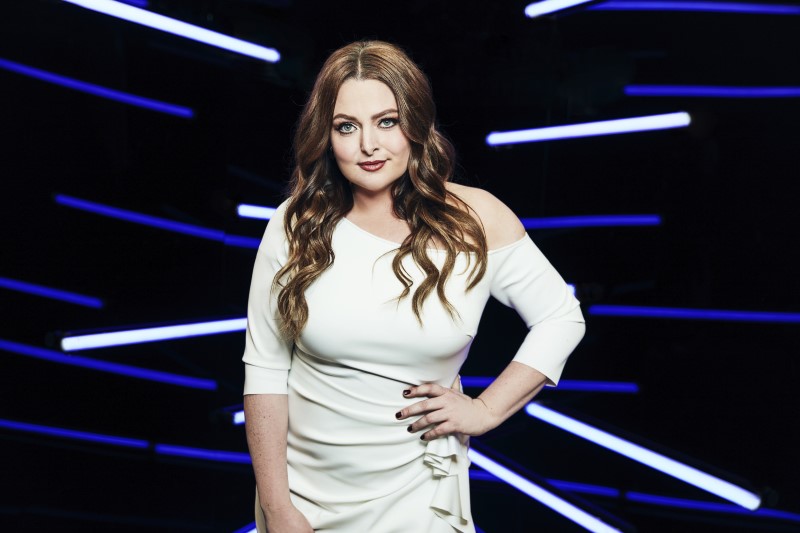
In any industry, for all women, it is a battle. The images that we are constantly shown from the time that we are children about what is beautiful and what is accepted are so overwhelming and suffocating that it’s been bred into most of us over time and that takes a lot to try to combat. I chose a profession where there is a lot of emphasis on those kinds of things.
It was my New Year’s resolution for 2019 that I had to stop speaking negatively about my body to myself or to anyone else. I made the active practice daily of saying something positive to myself, either out loud or in my mind. I’m not suggesting that everything was fine all of a sudden. Everybody can tell you something that they hate about themselves, but anytime I had one of those thoughts, I would try and notice that it was happening and replace it with a positive thought. I can say 15 things that I hate about my body but I can also tell you 15 things that I love about it. Just focusing on those things that I love has made such a shift for me. It really did change my life to implement that kind of daily practice.
I started speaking about it out loud. I would be in a conversation with somebody and would just throw out that “I have the best butt in the game. It’s so hot.” It disarms people when you speak about yourself in that way. As women, we have it programmed that if you speak about yourself too positively, then you are bragging or conceited and I think that’s just bullshit. I remember trying to go on a diet when I was eight years old. The fact that enters your mind as a child is such proof that this programming is bigger than all of us. It took me until my mid-thirties before I thought you have to stop this. Once I made that choice, it has changed my life for the better.
For the most part, I get so much positivity, love and support on social media. For every one person that says something negative, there are 200 that will come after them. I think that in trying to be positive and putting out positivity – people feel that energy and it’s been lovely to get that energy back. When I put out body positive posts, hearing women respond that they needed to hear that message made me realize that I have a real opportunity to speak to someone [via the internet], having never met them, and change their day for the positive – that’s a gift. Ignoring that feels like a disservice to myself.
You have been an inspiration to Canadian hopefuls and to women who may previously not have been comfortable speaking out about PCOS. Who inspires you?
I’m inspired by so many people. I went [to Washington] with an organization called PCOS Challenge last year. It was this massive group of women and we went to speak to Congress people and Senators about getting legislation changed and more funding for PCOS research. It was so inspiring to meet all of these different women from every walk of life. There was an ex-military woman who spoke about her experience going through PCOS in active duty. There were doctors, moms and teens. It was just a cross-section of so many different women who were all brought together by having this shared experience. It was one of the most inspiring chunks of time that I’ve had in my entire adult life.
Getting heard by our representatives was a really powerful thing. Your representatives are there for you and as public servants, they work for you. I encourage everybody to reach out to their representatives whether they are in Canada or America if they want their voice to be heard. It is their job to listen, and if enough people speak up, change does happen.
I’ve been on a TV show for five years with America Ferrera who is one of the greatest socio-political advocates of our generation. She has been using her voice and platform for years to make change and to spread the word about so many amazing issues. She’s also training for a marathon while shooting a show for 12 hours a day. She takes it as part of her job to use her voice for good, and it rubbed off on me. She’s wildly inspiring to me.
For more inspiration, follow Lauren Ash on Instagram and follow PCOS Sisterhood.




